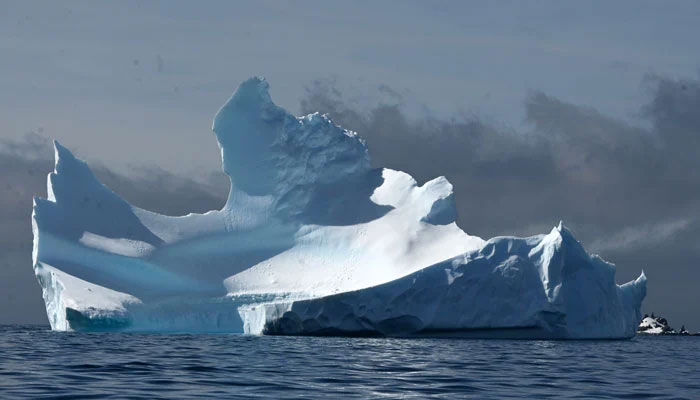Melting Antarctic could impact oceans ‘for centuries’
New modelling points to faster Antarctic ice melts driving a “substantial slowdown” of water circulation in the ocean depths
SYDNEY: Rapidly melting Antarctic ice threatens to dramatically slow deep-water currents in the world´s oceans, scientists say, impacting the spread of fresh water, oxygen and life-sustaining nutrients for centuries.
New modelling points to faster Antarctic ice melts driving a “substantial slowdown” of water circulation in the ocean depths if global carbon emissions remain high, researchers said in a study published in “Nature” on Wednesday.
The “overturning circulation” of waters in the deepest reaches of the oceans would slow by 40 percent by 2050 in a high-emissions scenario, according to the study, which warned of impacts that would last “for centuries to come”.
If the model holds, the deep ocean current will be “on a trajectory that looks headed towards collapse”, said University of New South Wales (UNSW) climate professor Matthew England, who coordinated the study.
Trillions of tonnes of cold, highly salty and oxygen-rich water sink around Antarctica each year, sending a deep-water current northwards to the Indian, Pacific and Atlantic oceans, scientists say.
The greater volumes of melting ice make the Antarctic waters less dense and salty, however, slowing the deep-water circulation with consequences for climate, sea level and marine ecosystems.
“If the oceans had lungs, this would be one of them,” England said. And if the oceans become stagnant below 4,000 metres, “this would trap nutrients in the deep ocean, reducing the nutrients available to support marine life near the ocean surface,” he added.
UNSW emeritus professor John Church, who was not involved in the study, said there were many uncertainties about the impact of declining deep ocean circulation. “But it seems almost certain that continuing on a high greenhouse gas emission pathway will lead to even more profound effects on the ocean and the climate system,” Church said. “The world urgently needs to drastically reduce our emissions to get off the high-emission pathway we are currently following.”
-
 Trump Passes Verdict On Bad Bunny’s Super Bowl Halftime Show
Trump Passes Verdict On Bad Bunny’s Super Bowl Halftime Show -
 Super Bowl 2026 Live: Seahawks Defeat Patriots 29-13 To Win Super Bowl LX
Super Bowl 2026 Live: Seahawks Defeat Patriots 29-13 To Win Super Bowl LX -
 Kim Kardashian And Lewis Hamilton Make First Public Appearance As A Couple At Super Bowl 2026
Kim Kardashian And Lewis Hamilton Make First Public Appearance As A Couple At Super Bowl 2026 -
 Romeo And Cruz Beckham Subtly Roast Brooklyn With New Family Tattoos
Romeo And Cruz Beckham Subtly Roast Brooklyn With New Family Tattoos -
 Meghan Markle Called Out For Unturthful Comment About Queen Curtsy
Meghan Markle Called Out For Unturthful Comment About Queen Curtsy -
 Bad Bunny Headlines Super Bowl With Hits, Dancers And Celebrity Guests
Bad Bunny Headlines Super Bowl With Hits, Dancers And Celebrity Guests -
 Insiders Weigh In On Kim Kardashian And Lewis Hamilton's Relationship
Insiders Weigh In On Kim Kardashian And Lewis Hamilton's Relationship -
 Prince William, Kate Middleton Private Time At Posh French Location Laid Bare
Prince William, Kate Middleton Private Time At Posh French Location Laid Bare -
 Stefon Diggs Family Explained: How Many Children The Patriots Star Has And With Whom
Stefon Diggs Family Explained: How Many Children The Patriots Star Has And With Whom -
 Shamed Andrew ‘mental State’ Under Scrutiny Amid Difficult Time
Shamed Andrew ‘mental State’ Under Scrutiny Amid Difficult Time -
 ‘Narcissist’ Andrew Still Feels ‘invincible’ After Exile
‘Narcissist’ Andrew Still Feels ‘invincible’ After Exile -
 Bad Bunny's Super Bowl Halftime Show: What Time Will He Perform Tonight?
Bad Bunny's Super Bowl Halftime Show: What Time Will He Perform Tonight? -
 Where Is Super Bowl 2026 Taking Place? Everything To Know About The NFL Showdown
Where Is Super Bowl 2026 Taking Place? Everything To Know About The NFL Showdown -
 Chris Pratt Explains Why He And Katherine Schwarzenegger Did Premarital Counseling
Chris Pratt Explains Why He And Katherine Schwarzenegger Did Premarital Counseling -
 Drake 'turns Down' Chance To Hit Back At Kendrick Lamar At Super Bowl
Drake 'turns Down' Chance To Hit Back At Kendrick Lamar At Super Bowl -
 Sarah Ferguson Had A ‘psychosexual Network’ With Jeffrey Epstein
Sarah Ferguson Had A ‘psychosexual Network’ With Jeffrey Epstein




